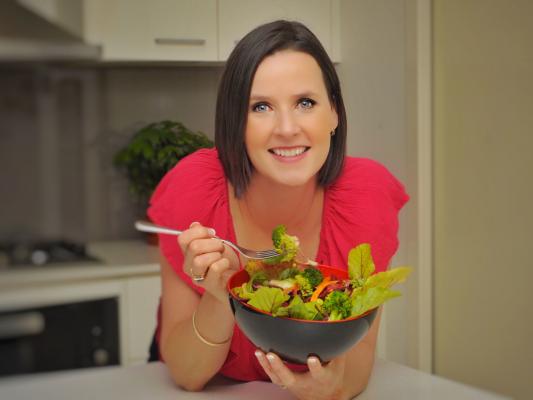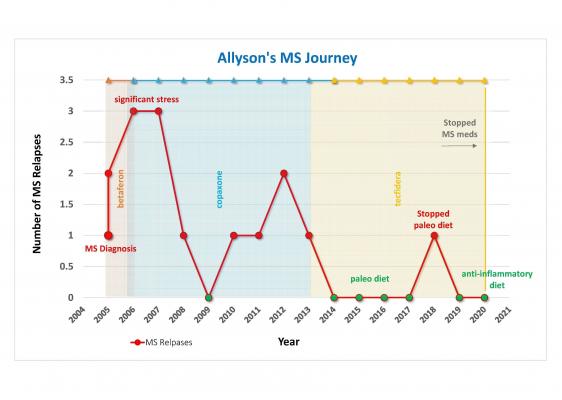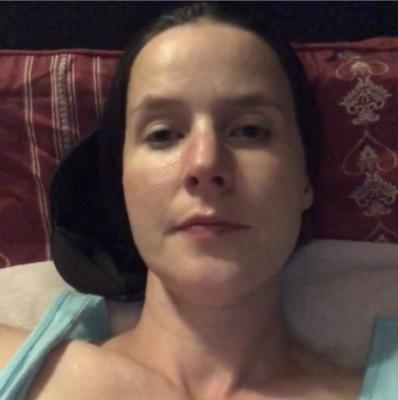Lara’s Allyson Brown credits a major dietary change for improving her health and reducing her relapses from multiple sclerosis (MS). She talks about her journey and her conclusions to Luke Voogt.
A relapse that gave Allyson Brown “such crippling fatigue” and “brain fog” she “could not calculate half of eight” sparked a dietary journey.
The 2018 relapse left Allyson unable to solve the simplest problems, despite her completing a PhD in forensic analytical chemistry more than a decade earlier.
“I was trying to scale a recipe and I actually had to ask my husband what half of eight was,” the 39-year-old remembered.
“I knew that I should know it but my brain was giving me a blank.”
Allyson had suffered a number of aggressive relapses since being diagnosed with multiple sclerosis (MS) in 2005 at age 23.
Despite these she went on to work full-time in various analytical roles at the Transport Accident Commission.
But the relapse forced her to quit her job, she said.
“I spent most of my time on the couch feeling exhausted even though I wasn’t doing anything. I had to resign from my job, fearing I would never be well again.”
Desperate to improve her situation, she began eating differently after reading several articles on how others had used dietary changes to improve their symptoms.
“I really didn’t want to leave that job – I remember saying to people, ‘I’m going to work out how to get my health back through my diet’,” she said.
“The diet was really hard when I had no energy. I wanted to quit as I was exhausted. But something told me to keep going… and I’m so glad I did.”
Over three months her symptoms “dramatically improved”, which she credits to her diet.
“Those early days were really tough,” she said.
“I didn’t wake up one day and think, ‘oh my god, I’m amazing again’.”
But gradually Allyson’s cognitive function returned and her depression and anxiety faded, she said.
“I almost felt like I had the energy that I did when I was a teenager. When you’re used to having no energy and you go to having all this energy – it feels amazing.”
Curious to understand her “renewed health”, she used her research skills to investigate the common links in 15 different diets.
She also set out to identify links between diet, autoimmune disease and gut health, and their relationship to chronic fatigue and brain fog.
Allyson said all the diets agreed on eating more vegetables and avoiding raw sugar, processed food and alcohol.
“It’s not rocket science that you need to eat more vegetables,” she said.
“A lot of what I found comes back to basic principles. But what we don’t often get told is that milk can be inflammatory for some people as well.”
Allyson believes that cutting dairy and gluten out of her diet helped improve her gut health and had flow-on effects for her mental and physical health.
“Where we eat those foods that I would call inflammable, it causes intestinal permeability or leaky gut,” she said.
“They lead to these little holes that appear in our gut lining.”
When the tight junctions of intestinal walls loosen, the gut becomes more permeable, which can allow bacteria, toxins and other particles to pass more easily into the bloodstream.
“When that happens, your immune system fires up,” Allyson said.
This could have a more serious impact on people that already have auto-immune diseases, like MS, she said.
“My immune system was going haywire.”
Allyson said her original diet was never particularly unhealthy, but she grew up with a mantra of “if it tastes good, eat it”.
She remembered her family’s weekly tradition of eating McDonald’s while watching variety show Hey Hey It’s Saturday on TV.
“Retrospectively, I wouldn’t say that [my diet] was that good,” she said.
She had previously thought of food as something to “tantalise our tastebuds” rather than “fuel” and being “very critical to my health”.
But after pinpointing refined sugar, processed foods, dairy and gluten as foods to avoid, she eliminated them from her diet.
She also mapped her entire MS journey in a graph showing the effects of stress, medications, different diets and other factors since her diagnosis in 2005.
The most recent section of the graph shows the effects of her new diet.
Wanting to help others to find their own “clean-eating solutions”, she started a health and wellness company called everheal, instead of returning to her old job.
“Unfortunately, rather than eating the healthy foods that fuel our bodies, our modern-day diets are often saturated with the foods to avoid,” she said.
“Eating nutrient-poor, inflammatory food is the same as filling up your unleaded car with diesel fuel – it won’t work properly as it doesn’t have the right fuel it needs to function.”
Details: everheal.com.au.
The Independent recommends consulting a general practitioner before making any major dietary changes.














